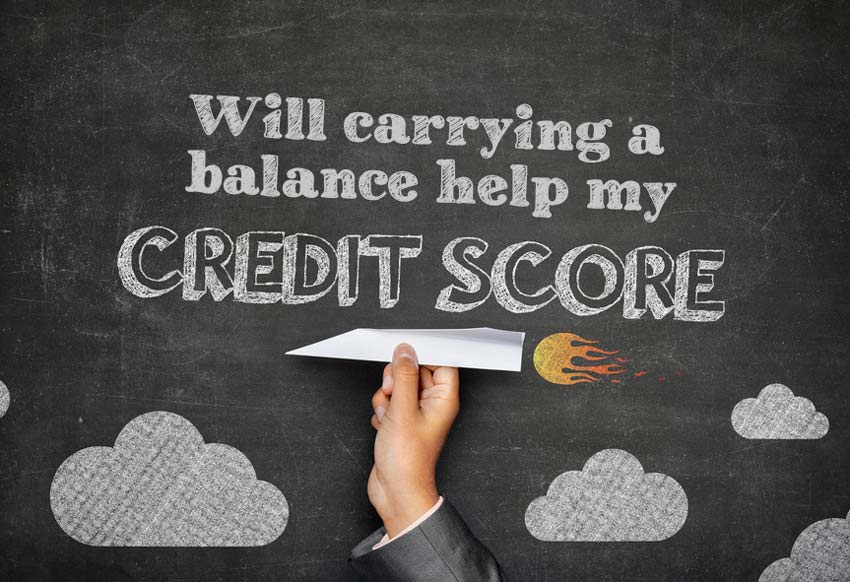The world is full of myths, and one might be costing you a lot of money. It’s the widespread belief that you need to carry a balance to improve your credit score.
You don’t. Repeat, you do not need to carry a balance on your credit card in order to improve your credit score.
Pardon the redundancy, but this might be the Loch Ness Monster of financial myths. It refuses to go away despite the lack of evidence it is true.
Approximately 57% of consumers carry a balance, according to a recent study. There are acceptable reasons for doing so, the main one being that they can’t afford to pay it off.
The alarming thing is how many people carry a balance for the wrong reason.
One in five of those consumers believe it will help their credit score. The truth is that leaving a balance subjects you to interest charges. Every cardholder probably realizes that, but many don’t think of it real-world terms.
The average monthly balance for Americans in 2022 was $5,910, according to Experian’s annual credit card survey. The average interest rate climbed to 20.68% by August 2023.
If you paid $5,000, leaving a balance of $910 you’d accrue $15.60 in interest each month.
Why pay that if you don’t have to?
Yet some terribly gullible people do because they believe it’s improves their credit score.
The myth’s origins are rooted in the belief that carrying a balance is necessary if you want to establish credit. Consumers want to show a record of paying off debts. After all, the main purpose of a having a good credit score is to qualify for more favorable loan terms.
You can establish a credit history through set payments like mortgage, car payments, personal loans, and through the revolving charges of credit cards. They all are evidence you are worth the risk of a loan to lenders.
“The only way I can be sure of this is you’ve taken the time to demonstrate your reliability, which means you’ve established a payment record,” said Dr. Paul Camp, a professor of Finance at Metropolitan State University in St. Paul, Minn. “The only way you can establish a payment record is to borrow money and then repay it, so that it shows up on your CBR (credit bureau report).”
So you should show a balance on your credit card. What you should not do is carry a balance.
Huh?
That’s the confusion that perpetuates the myth.
Credit card utilization makes up 30% of your credit score. That is how much of your available you are actually using. The less available credit you use, the higher your credit score.
For instance, if you have a $5,000 limit on your credit card and have $2,500 in charges, your utilization rate is 50%. That would not be good since anything more than 30% will adversely affect your credit score.
But if your utilization is 0%, you won’t establish a credit history. It seems like a catch-22. You’re being responsible by paying off your credit card, but you’re being irresponsible by not using it to establish a credit history.
You can actually pay it off and establish a history. Just repeat two key words:
Grace period.
Credit card purchases don’t start racking up interest charges right away. Most cards offer grace periods, which is the time between the end of the billing cycle and the payment due date.
It should not sneak up on you since consumers are supposed to receive their monthly statements at least 21 days before the payment is due, according to the Credit CARD Act of 2009.
Simply put, if you pay your balance in full by the due date, you will not incur interest charges. But you will establish a payment history.
“You’d demonstrate your ability to budget and manage your money and build a payment record,” Camp said, “but at zero carrying cost.”
You are showing a balance, but not carrying one.
Just make sure you pay on time. Being delinquent will show up on your credit report and could endanger future grace periods.
If you lose your grace period you will be charged interest on your balance. You will also be charged interest on new purchases starting with the date the purchase is made.
That’s one way American have managed to pile up $104 billion in credit card interest and fees in 2018, according to a study by Magnify Money. Oftentimes the only way out is through a debt management program offered by nonprofit credit counseling organizations.
Experts advise using only one credit card, keeping balances low and paying them in full every month.
“Otherwise, and what I worry is happening, is that people are carrying balances not to help their credit score but because it’s simply less painful than paying the credit cards off,” Camp said. “I fear the ‘Help My Credit Score’ gambit is simply a rationalization and nothing more.”
So if you really want to improve your credit score you need two main things – Knowledge and the discipline to act on it.
If enough people use those, it may one day kill the Loch Ness Monster of financial myths.
Sources:
- (Skoneki, M.)(2018, July 2). 43 million Americans wrongly carry credit card balance to improve credit score, report finds. Retrieved from: http://www.spokesman.com/stories/2018/jul/02/43-million-americans-wrongly-carry-credit-card-bal/
- (Wathen, J.)(2017, December 22). Why carrying a credit card balance isn’t necessarily a bad thing. Retrieved from: https://www.usatoday.com/story/money/personalfinance/budget-and-spending/2017/12/22/60-of-credit-card-accounts-carry-a-balance-heres-why-that-isnt-necessarily-a-bad-thing/106702290/
- (Sullivan, B.)(2018, January 11). State of Credit: 2017. Retrieved from: https://www.experian.com/blogs/ask-experian/consumer-credit-review/
- (O’Brien, S.)(2018, July 20). Consumers paying $104 billion in credit card interest fees. https://www.cnbc.com/2018/07/19/consumers-paying-104-billion-in-credit-card-interest-and-fees.html


















